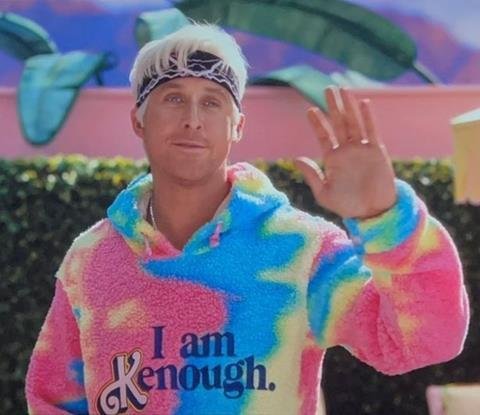When it comes to identity, it’s easy to be critical of the stereotypes, or the lack of answers provided by Barbie, but has the Church done any better? We can only understand what it is to be human in light of the larger God story that has shaped our world, says Peter Lynas

Barbie is a billion-dollar blockbuster movie with a philosophical edge - wrestling in a pink paradise with existential angst and an identity crisis. And it’s generated plenty of commentary, both in culture at large and within the Church. For some, its peak feminism - for good or bad. For others, it perpetuates all the worst stereotypes. But whatever line you take, it is resonating with audiences across the world - including three generations of my own family, which is a rarity!
It’s important to remember that Barbie is, at heart, a satire, poking fun at nearly everyone. It is laugh out loud funny in parts, but also uses humour to ask some hard questions about feminism, patriarchy and much more. “Thanks to Barbie, all the problems of feminism have been solved,” the narrator tells us, tongue in cheek. While Ken “does beach”, until he discovers patriarchy, only to conclude it’s really just about horses! In one stand out quote, a character observes: “Women hate women. And men hate women. It’s the only thing we all agree on.”
In the real world, like Adam and Eve, they become aware of their nakedness - or at least their lack of genitalia
Margot Robbie’s stereotypical Barbie outgrows its box and ventures into the ‘real world’. Along the way she learns about her creator, the pitfalls of pursuing perfection, the moral implications of the choices we make and wrestles with her own mortality.
Essentially, the movie asks the question of the moment: What is a woman? Was Barbie a force for good, depicting women as doctors, lawyers and astronauts, or did it simply promote a crushing, unachievable physical ideal? The answer is perhaps both - and the movie acknowledges the tension of this reality.
It also implicitly asks the question that our culture seems less concerned about: What is a man? In Barbieland, Ken is nothing without Barbie – “He’s. Just. Ken” In the real world, Ken is king, though the shortcomings of patriarchy are also made clear. One friend advised me not to watch the movie because of its rampant feminism and emasculation of men. I must have missed that bit. Instead, Ryan Gosling’s Ken, with his “kenergy” and “mojo dojo casa house” was a clear reminder to me that, in the end, the subjugation of either sex doesn’t work for men or women.
A biblical analogy
Speaking to Vogue, the Barbie director and co-writer Greta Gerwig has commented on a subtle Genesis comparison in the movie, comparing Ken’s creation after Barbie’s as an inversion of God’s original creation story. Barbie and Ken are her Adam and Eve, living in a perfect, Eden-like world called Barbieland where “every day is the best day ever”.
Then, from nowhere, Barbie has irrepressible thoughts about death. When tragedy strikes, in the form of flat feet and cellulite, Barbie leaves paradise for the real world with Ken in tow. In the real world, everyone is looking at them and they are suddenly self-conscious; like Adam and Eve, they become aware of their nakedness - or at least their lack of genitalia.
In the real world, men leer at Barbie and want to have dominion over her. Ken, on the other hand, discovers patriarchy. Feeling seen and respected, he returns to Barbieland bringing with him what might be described as the consequences of original sin with him. The Kens set up Kendom and convince the Barbies to take on submissive roles. One hegemony replaces another.
Redemption is required - step forward “white saviour Barbie”. Her path back to restoration includes meeting with her maker and a discussion about the purpose for which she was created. Ruth Handler, the original creator of Barbie, offers her a choice: a plastic life in which “every day is the best day ever” or to become human, with all the joy, pain and the inevitable death that comes with it.
As the movie closes, heaven isn’t found in a return to the original premise of Barbieland, but a new world in which the Barbies and Kens can better live in harmony and equality. The final scene is also deeply intriguing - in the real world, Barbie is dropped off at an unmarked office, where she marches up to the desk and announces proudly: “I’m here to see my gynecologist.” Perhaps biological reality does matter, after all, when it comes to being a woman.
Being human
Now all this may be pushing the theological analogy too far, but Barbie does ask some great questions about life, death, gender, consumerism and the impossible expectations we place on ourselves and others.
It’s easy to be critical of the stereotypes, or the lack of answers provided by the movie, but have we, as the Church, done any better? All too often we have been happy to baptise cultural ideas and stereotypes around gender, focusing on Genesis 3 to the detriment of the first two chapters.
In the end, the subjugation of either sex doesn’t work for men or women
Ultimately, Barbie is about a search for meaning and purpose - and the movie freely admits that the answers our culture offers aren’t great. It asks what it means to be human - the question at the heart of the Being Human project which I co-lead. It’s a great question, and offers a springboard to deeper conversations about the dignity, equality, meaning and purpose found in the God story. It invites us to talk about Jesus - the truest human being to ever live - and his invitation to follow him.
But Barbie also reminds us that glib answers won’t cut it. It invites us, as Jesus followers, to wrestle with the challenges of feminism and patriarchy and offer a better story of what it means to be a man or a woman today. There are fragments of truth all around us, buried in the mess and chaos of our cultural moment. Like looking at the shards of a shattered mirror, we can still see our reflection, but the sharp edges cut us as we grasp after them, seeking the fullness of who we are. Instead, we have to view those truths within the larger God story - the good, true and beautiful story of what it means to be human.
It is a story that says: “You are Kenough” - and you don’t need a multicoloured hoodie to prove it!






































No comments yet